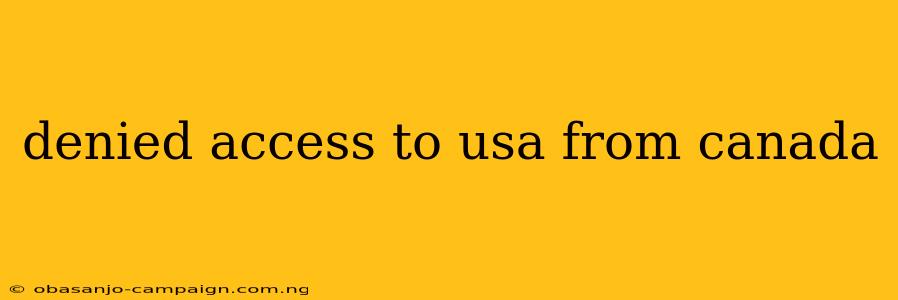Denied Access to the USA from Canada: Understanding the Reasons and Recourse
Being denied entry to the United States from Canada can be a frustrating and stressful experience. The reasons behind such denials can vary, ranging from inadequate documentation to concerns about potential immigration violations. Understanding the common causes for denial and the available options for recourse is crucial for travelers seeking to enter the US. This article delves into the complexities of denied access, examining the potential reasons, navigating the appeals process, and exploring ways to prevent future denials.
Common Reasons for Denied Access to the USA from Canada
Insufficient Documentation
One of the most common reasons for denial is inadequate or missing documentation. The US Customs and Border Protection (CBP) officers require specific documents, depending on the type of travel. These might include:
- Valid Passport: A passport with at least six months of validity remaining is crucial.
- Visa (if required): Depending on your nationality and purpose of travel, a visa may be required. Ensure you have the appropriate visa type.
- Visa Waiver Program (VWP): For eligible nationalities, the VWP allows visa-free entry for tourism or business purposes. However, travelers must meet specific requirements, including holding an electronic travel authorization (ESTA).
- I-94 Arrival/Departure Record: This document is issued to non-immigrant visitors upon entry to the US. It records the traveler's entry date, authorized stay duration, and the port of entry.
Potential Immigration Violations
CBP officers are vigilant in preventing individuals from entering the US who may pose a risk to national security or immigration law. The following are some potential reasons for denial based on immigration concerns:
- Previous Immigration Violations: Prior violations, such as overstaying a visa or working without authorization, can significantly impact future entry.
- Criminal Record: Certain criminal convictions can lead to denial, even for minor offenses.
- False or Misleading Information: Providing inaccurate or misleading information on visa applications or at the border can result in denial.
- Lack of Ties to Home Country: CBP officers may deny entry if they believe the traveler may overstay their visa or attempt to remain in the US illegally.
Navigating the Appeals Process
If you are denied entry to the US, you have the right to appeal the decision. The appeals process involves filing a formal request for reconsideration with the CBP. This can be done in person or through a representative.
Steps Involved in the Appeals Process:
- Request for Reconsideration: Gather all relevant documentation, including your passport, visa, previous entry stamps, and any evidence that supports your case. Submit the request through the designated channels.
- Review and Decision: CBP will review your appeal and provide a decision. This process can take several weeks or even months.
- Appeal to the US Department of State (DOS): If your appeal with CBP is unsuccessful, you can file an appeal with the US Department of State (DOS). The DOS has the authority to overturn CBP decisions.
- Legal Representation: Consider consulting an immigration lawyer if you are facing complex legal issues or believe your denial was unfair.
Preventing Future Denials
Understanding the Requirements:
Thorough research is essential. Understand the visa requirements, including eligibility criteria and documentation needed, for your nationality and purpose of travel.
Submitting Accurate and Complete Information:
Ensure that your visa application or other travel documents are accurate, truthful, and complete. Avoid misleading information or omitting crucial details.
Maintaining a Clean Immigration Record:
If you have previously been denied entry or have a history of immigration violations, address these issues before planning future trips.
Seeking Legal Advice:
Consulting an immigration lawyer can help you understand your rights and navigate the complexities of immigration law. They can advise you on the best course of action, including how to prepare for future travel to the US.
Conclusion
Being denied access to the USA from Canada can be a challenging experience. However, understanding the reasons for denial, navigating the appeals process, and taking steps to prevent future denials can empower travelers to overcome these hurdles. By carefully reviewing and understanding the requirements, submitting accurate information, and seeking professional guidance when needed, individuals can increase their chances of a successful entry into the United States.
